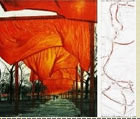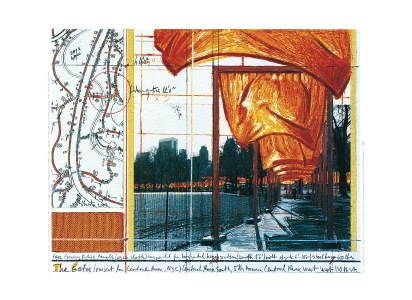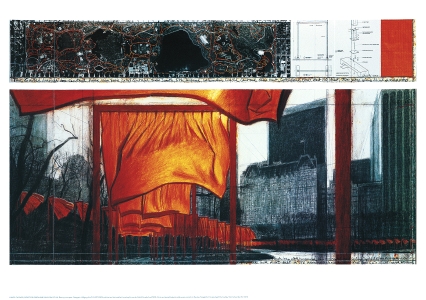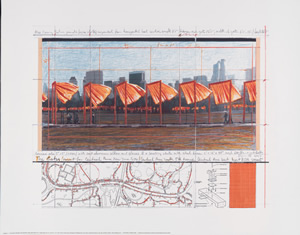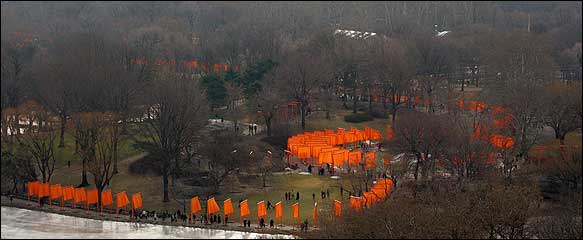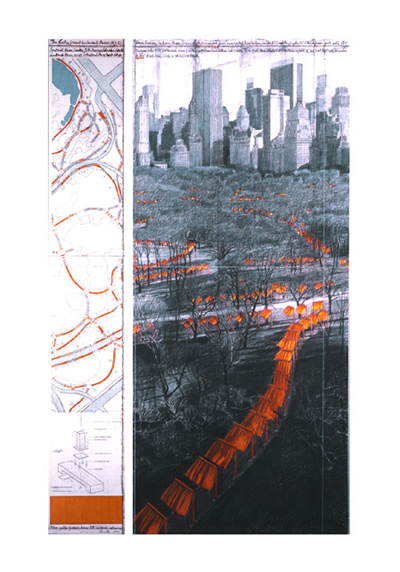Beauty: A Conversation
Bryn Mawr College
February 15, 2005
The Difference Between Art and Science
(The Difference Between Beauty and Truth?)
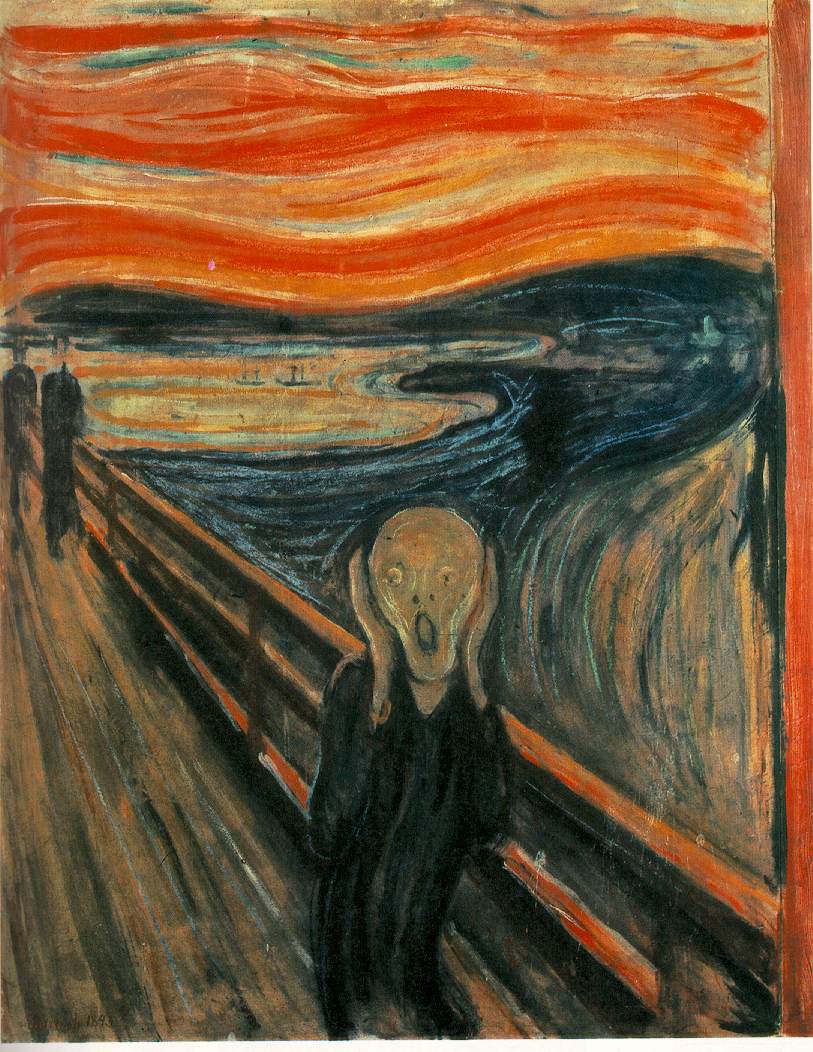 | "From this Munch painting...the observer
could scrape an orange
micron speck. He could
mount it on a slide, fine-tune
the fast beams...The search
is for the force of the scream.
But the particles' pry is
too strong...." Roald Hoffman,
"The Difference Between Art and Science" |
Alternatively, an English professor could take a long Sunday afternoon walk through
"The Gates, Central Park, New York, 1979-2005"
Christo Posters for "The Gates"
...and bring back some swatches for you to examine, microscopically.
Would you attain thereby the beauty of the experience?
And/or perhaps another "deeper" sense of beauty?
Some of us questioned the equation of reduction and symmetry with beauty:
Catherine : I dont like the idea of reducing beauty to equations or theories.
Katy: physics being beautiful...seemed like an oxymoron and quite impossible....
Amanda:
a number of "beautiful" women have slighttly assymetrical characteristics....Does the simple distraction of the exact symmetry make something even more beautiful?
Meera: who is to say that a something that is not symmetrical- is not [beautiful]?
(Many!) others of us celebrated the beauty of balance, compression and summation:
eebs:
people...probably feel some sort of aesthetical pleasure when they see that something is balanced.... i thought of [equations] also being a way of balancing things- one side balancing another... i am amazed by how the two seemingly unequal sides are equal.... in nature, we see all sorts of mathematical sequences, patterns and ratios that makes everything beautiful- from all of natures' fibonacci sequences/paterns, to the golden ratio of the human face-- something that is geometrically or mathematically 'beautiful' is probably created like that on purpose.
Alice S.:
I cannot look at an equation and think it beautiful because it is symmetrical, but I realized that what is beautiful is what it represents...because they take something so large and difficult to understand and put it in this small, simple equation....
Malorie:
the to be possibly math major that I am...I love to see large things condensed into smaller ones....I may exclaim "Beautiful!" when an equation works out....Fractals...are Series of numbers- where you perform the same operation over and over again, using the information you got previously to solve the next one. I just think it's so beautiful that you can explain something visual like that mathematically.
Kara : equations for me sort of embody what beauty really is. You look at an equation, and its a summary of a very complicated idea compacted so that your mind can grasp it all at once....the other truly beautiful thing about equations [is] that they can summarize a relationship between two otherwise unconnected things....
Elizabeth:
some of the most beautiful equations are where science has managed to boil down years of observation into a single, simple, brief forumla....Nature, while filled with millions of different complex structures, was comprised of very simple rules. So when a scientist manages to find one of these simple rules...there is...a sense of beauty....
Jaya: the idea that a jargon of symbols, numbers, and equations can explain the universe in such a simple way is truly a magnificent thing...
Flora :
what intrigues me [is that at] any time, we could find something that doesn't fit in the theories yet and then have to remodel everything to form a more perfect (and thus, more beautiful?) system....to me, physics is beautiful because it's sort of a huge mental sculpture of the world....it models the world as best it can. And I think Peter's correct. Pictures have little to do with it except maybe to help you see the sculpture a little better. And the equations have little to do with it.
Whether such beauty is an index to truth has been a matter of considerable discussion:
Meera: I found it difficult to comphrehend how beauty makes a theory true....Maybe someone can clarify this point in class for me?
Some of us find the truth-value of beauty to be obvious...
Amy:
like the phyists, I am awed by the design and
symettery of G-d's hand.... to me it seemed almost self evident that when we find something beautiful we immediately think of it as a truth....
Krystal: in science and mathematics classes... the equations that look more simple or more 'beautiful' seem more truthful to me. It's just a gut feeling I have.
Tanya :
theory is not deemed beautiful until it has experimental backing....Most things in nature have proved to be harmonious, interdependent, and dichotomous. Someone created everything so that it could all fit together with purpose....if I was to create a world that needed to run as efficiently as possible, and needed to meet certain criteria, how would I do it? Simplicity, balance, and the perfection of symmetry tend to be reasonable characteristics of that world....
Others of us don't see causation, but do see a correspondence, between beauty and truth...
Alanna: I feel that the connection with truth can only be made when that theory/equation has successfully passed experimental tests.
Mo :
undeniable repeated empirical success can over time make something more beautiful....beauty follows truth. We see beauty in things that we can KNOW to be true. Truth first, and beauty will ultimately follow.
Rachel : To me, beauty has a place in science as a guide for inquiry but not as a label of certainty....scientists' aesthetic preferences are culturally acquired....Aesthetic preferences change with the times; the laws of physics...are not.
And some of us question the existence of truth altogether (or rather science's ability to identify it....)
Alice K:
there is an active choice in what physicists call true...simply if the math looks prettier (Peter Beckmann may say as much...since I'm pretty much directly quoting him)....certain equations and concepts are much less messy to work out. Unfortunately, there is no guarantee that the universe is designed to be mathematically simple and tidy....This method of picking the neater equations for explaining the universe virtually guarantees that we can't get to any fundamental truths....Can we start with basic axioms to prove something? Can we pick any starting point and say "this is real, this is true?"....how do we know that the data we collect isn't affected by us?
Annabella :
what if truth can can be influenced by the imprint of our belief of it, much as quantum physics has determined that nothing can be observed without being changed by the act of observation? What if there is no absolute truth, but the one each individual holds as true? What if the truth is actually relative and not absolute?
Liz: Science cannot give us truth; it gives a possible explaination based on evidence....if beauty needs some element of truth science must be ugly....I do not, however, think that truth and beauty are really related in any definatble manner. Everything that a person views is tainted by her experiences and background. We can never escape from the trapping of our mind and see some universal truth....
| Course Home Page
| Course Forum
|Science in Culture | Serendip Home |
Send us your comments at Serendip
© by Serendip 1994-
- Last Modified:
Wednesday, 02-May-2018 10:51:34 CDT

